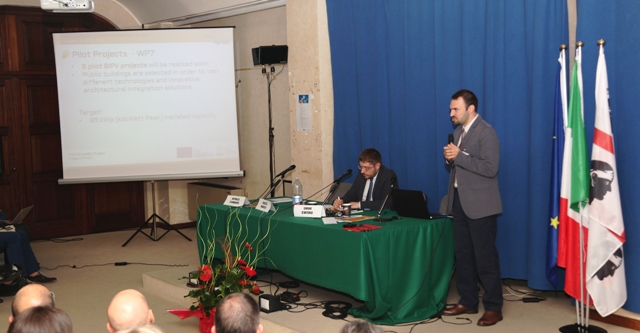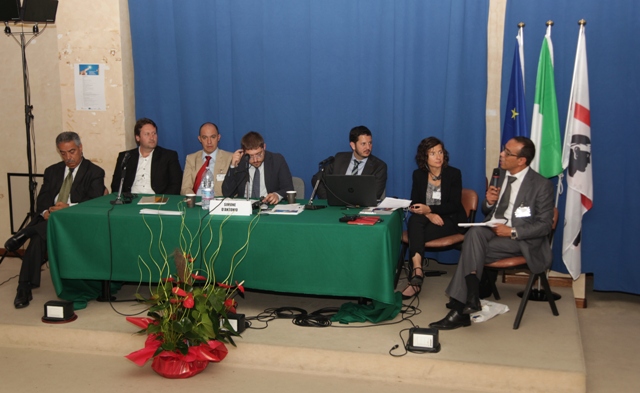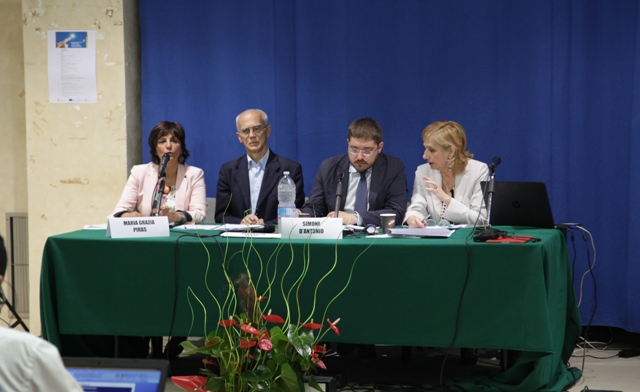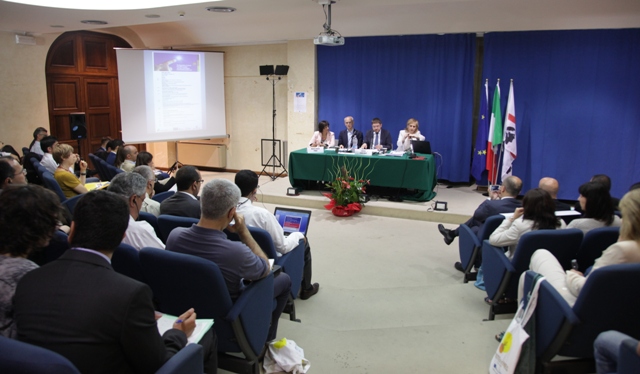Share policies to Foster renewable energies and solar technologies in the Mediterranean area
On Wednesday the 10th of June 2015 in Cagliari, Italy, the project organized a round table in order to “Share policies to Foster renewable energies and solar technologies in the Mediterranean area.
The event intended to identify normative and administrative barriers that prevent the diffusion of solar technologies. FOSTEr in MED aims to promote the adoption of building integrated solar photovoltaic technologies in six Mediterranean countries: Italy, Spain, Lebanon, Egypt, Tunisia and Jordan.
The event was organized by project partner Region of Sardinia, Industry Department. Mrs. Maria Grazia Piras, Councillor for Industry of the Region of Sardinia opened the conference remarking that: “the promotion of eco-efficiency and reduction of primary energy consumption in buildings and public facilities is a key element of regional energy policy, fully implemented in the POR-FESR 2014-2020 that we submitted to the European Commission”.
Mrs. Anna Catte, Director of the Joint Managing Authority of the ENPI CBC MED project, recalled the words of EU Commissioner Johannes Hahn ( responsible for the European Neighborhood Policy & Enlargement Negotiations), who said during the NextMed Conference (Brussels, 28th of May 23015) that the ENPI CBC MED is a source of inspiration for the European Unions relations with neighboring countries, thanks to its ability to stimulate projects projects that can provide common solutions to the Mediterranean regions needs.
She also highlighted the challenges of the new Programme for the period 2014-2020, namely: support to SME development with attention to Euro-Mediterranean economic clusters and start-ups; support to innovation and technological transfer processes; fight against poverty and social inclusion; environmental challenges. The ressouces aloocated to the Programme by the EU are € 209 million.
Prof. Antonello Sanna, Director of the Department of Civil and Environmental Engineering, and Architecture of the University of Cagliari, noticed that FOSTEr in MED turns on the spotlight on a strategic theme for community life, as sustainable energy on which the Mediterranean community can meet to promote a new model of development.
It stressed the importance of a work program based also on the diffusion of knowledge.
During the event, Eng. Tajal Salem presented the project, on behalf of Lebanese project partner Industrial Research Institute (IRI), stressing out that FOSTEr in MED aims to cover the entire area of the Mediterranean, with a awareness campaigns that involved students and citizens. Noteworthy, Foster in MED has gone far beyond its goals, reaching 3500 students. Among the other results to achieve, there is the upcoming training of 120 installers on the latest generation of solar panels, an activity that will begin in September.
The second part of the morning was dedicated to the round table with the representatives of local administrators of the six countries involved in project: Dr. Stefano Piras, Director of the Energy Service of the Region of Sardinia (Italy); Dr, Abdelkarim Ghezal, Director of Renewable Energy in the National Agency for Energy Conservation Efficiency and Dr. Abderraouf Ben Said, Head of the Department of renewable energy in the Tunisian Agency for Professional Training (Tunisia); Mr Pierre Khoury, Director of the Lebanese Center for Energy Conservation (LCEC) and Mr Edgar Hajje, board member of Byblos municipality (Lebanon); Eng. Ziad Jibril Sabra, Advisor to the Minister of Energy and Mineral Resources and Eng. Walid Shahin, Director of the National Energy Research Center (Jordan); Eng. Ehab Ismail, from the New and Renewable Energy Authority (Egypt) ; Mr.s Mireia Cañellas, Responsible of Sustainable Development of the General Directory of Environmental Policies of the Department of Territory and Sustainability of the Generalitat the Catalunya and Mr Pablo Valderrama, Cluster Manager of Solartys Spanish Association for the Internationalization and Innovation of Solar Entities (Spain).
The representative of local administrations and the experts involved in the debate raised the need to implement and improve financial incentives and loans related to renewable energy and to find common solutions to foster the photovoltaic technologies in the Mediterranean area. Public Policy recommendations have been shared with partner countries through six policy papers aimed to be discussed at political level in each country. Recommendations have been directed to overcome social, economical and regulation barriers to support a widespread diffusion of innovative solar technologies.
The key role of public institutions was highlighted with regards to communication in order to improve information and awareness amongst the citizens surrounding environmental issues, renewable energy and energy efficiency. Public institutions should also work towards supporting the transfer of competencies and strengthening the cooperation in order increase technical knowledge on innovative solar technologies.
During the afternoon session the Midterm conference was organized by the Promotional Services Centre for enterprises, Special Agency of the Cagliari Chamber of Commerce (CSPI), with the aim to take stock of the state of the project implementation.
FOSTEr in MED is a project financed for an amount of 4,05 million Euro by European union through the ENPI CBC Mediterranean Sea Basin Programme (total amount of 4,5 million Euro). Project partnership is composed by: Beneficiary University of Cagliari (UNICA); Association of the Mediterranean Chambers of Commerce and Special Agency Industry (ASCAME); Promotional Services Centre for enterprises of the Cagliari Chamber of Commerce (CSPI); Confederation of Egyptian European Business Associations (CEEBA); Industrial Research Institute (IRI); Royal Scientific Society (RSS); Chamber of Commerce and Industry of Tunis (CCI Tunis); Autonomous Region of Sardinia (RAS).







